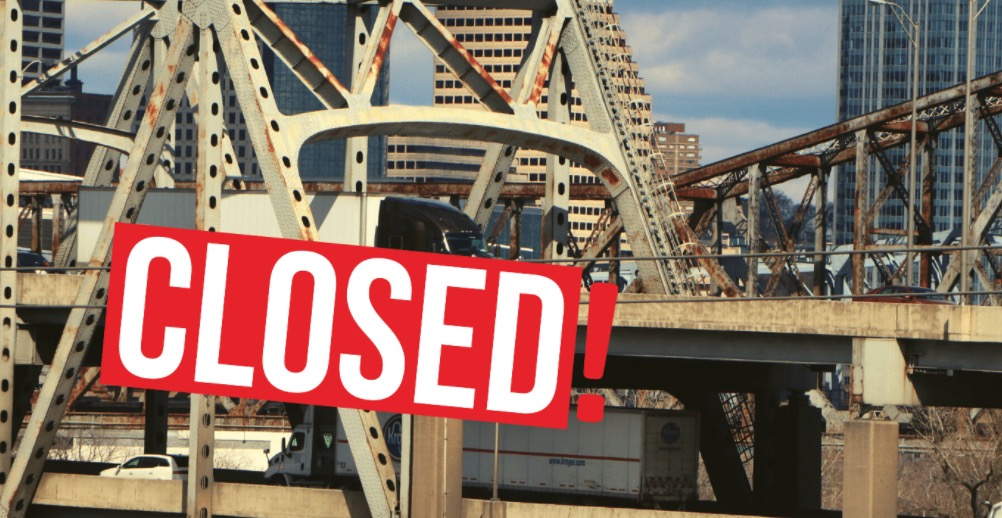Originally posted on FasterBetterSafer, the blog of Americans for Transportation Mobility
In 2019, the United States‘ Gross Domestic Product (GDP) was $21.43 trillion. However, not a penny of that would have been possible without a national commerce framework and connected transportation system — the latter of which is breaking down, lacks longterm federal funding, and whose footprint is increasingly more fragile.
The Americans for Transportation Mobility (ATM) Coalition takes on this topic in its newest grassroots podcast about Kentucky’s landmark Brent Spence Bridge.
One billion dollars worth of business a day and three percent of yearly GDP move over that bridge alone. But this southeastern nexus between the Bluegrass State and Ohio has been functionally obsolete (capacity wise) for 20 years. At 3 a.m. two weeks ago, colliding semi-trailers, with one hauling the caustic chemical potassium hydroxide, resulted in a catastrophic accident, a fire, traffic backups, and a damaged and temporarily closed bridge.
It is projected the bridge will be repaired by Dec. 23, 2020, but it could take longer.
A shutdown like this has a tremendous impact on the public, logistics, manufacturing and healthcare, says Northern Kentucky Chamber of Commerce President & CEO Brent Cooper. The Chamber has been advocating for many years for Kentucky and Ohio, and for the federal government, to secure their respective shares of funding for a new bridge that will cost several billion dollars and modernize this corridor.
Kristin Baldwin, the Chamber’s Vice President of Public Affairs & Communications, has recently been responding to never-ending media queries about the disaster. Dozens of broadcast pieces and stories have been aired or published.
“This is an example of the problem with transportation in the country,” says Cooper. “We, as a country, just have not invested in infrastructure and we are starting to see it on multiple levels and it’s bigger than just the Brent Spence, although the Brent Spence, to me, is the mother of all examples because it’s listed as No. 2 or 3 in the country as [one of the] most dangerous, most needed, infrastructure projects.”
Cooper explains that congestion continues to make the corridor extremely dangerous, and commuters are three to five times more likely to have an accident on the Brent Spence Bridge than any other section of interstate in the tri-state area.1 He adds that there are 650 calls annually concerning accidents or people needing help on that stretch.
Varying lawmakers at various times, as well as at different levels of government and from different parties, have spoken about how important a new bridge is. But a widespread commitment to a plan, political courage, and raising user fees have not followed. A safer crossing with emergency shoulders and wider lanes has become a priority. The nearly 60-year-old structure was built for 80,000 vehicles daily, but it has been carrying around twice that amount every day.
This bridge, however, is not just making regional headlines. It is a poster child for how a national policy impasse on increasing federal infrastructure investment, and not shoring up sustainable funding, can kneecap regional communities, hurt the nation’s economy, and erode public safety.
While many surrounding states have passed fuel tax increases or created new revenue sources (for example, through vehicle registration fees) for transportation maintenance and expansion, Kentucky hasn’t and is not in sync with Ohio about using tolls to finance the bridge. Congress also has not passed any new bipartisan vision to generate cash from users of the U.S. transportation system or integrated additional mechanisms, such as vehicle miles travelled (VMT).
The historic, and now fiscally challenged, Highway Trust Fund (HTF) has provided revenue to state departments of transportation and public-transit systems through a federal tax on fuel. But Cooper emphasizes that it’s hard to revive and modernize a highly fatigued transportation network running on the fumes of a 1993 gas-tax rate.
“I think the federal government should raise the gas tax. It hasn’t been raised since ’93. In our opinion it’s a user fee. You don’t have to pay that tax if you don’t buy fuel, but if you buy fuel and you’re going to drive on our roads, you should pay for that. And that is reasonable good governance in our opinion and we’re not alone in saying this. Multiple chambers of commerce all around the country, including the U.S. Chamber, have talked about this for decades and so that’s one thing they could do,” says Cooper. “They could raise the gas tax, they could consider doing reasonable fees on electric vehicles, or go to a miles-driven tax. Those kinds of things are, again, reasonable and necessary at some point. As fuel becomes more efficient, and there’s more electric vehicles, they have to find a way to have people who use the roads pay for the roads that they drive on.”
Recently, Kentucky Senator Mitch McConnell announced a $12 million emergency grant for repairs, which includes funding for materials and steel for the bridge, from the U.S. Department of Transportation (DOT). Nonetheless, it’s not lost on anyone that McConnell, who is the Senate majority leader, has not been able to hammer out a bipartisan infrastructure package. The grant is just patching a much larger problem.
Kentucky’s bridge story is really a window into America’s political gridlock and infrastructure-investment vicissitude too. From Michigan to Florida, the Brent Spence Bridge corridor makes mobility possible on intestates 71, 74 and 75. Additionally, the Greater Cincinnati Airport is in Northern Kentucky and now customers will face a detour and longer travel times. Finally, more air pollution is created by motorists sitting in traffic jams for hours and the public’s quality of life suffers.
But hope for a new Congress and Administration to provide boosted investment — and to transform a system based on the foundation of a National Highway System built almost 70 years ago — is alive and stakeholders are not giving up.
1. http://buildournewbridgenow.com/how-were-blocked/safety/
https://soundcloud.com/user-248971192/kentuckys-shutdown-of-brent-spence-bridge-proves-us-infrastructure-capacity-needs-are-major-safety-economic-concerns
Tags: Americans for Transportation Mobility, ATM, Brent Spence Bridge, Kentucky, KY, U.S. Chamber of Commerce







 RSS Feed
RSS Feed